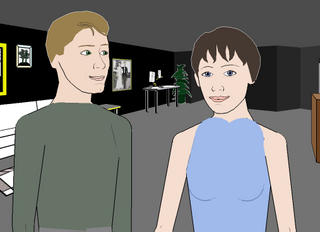
You're going to see a lot of these people
My initial reaction is one of slight disappointment, although this just means that like many, I love the idea, but feel that the execution is somewhat lacking. I am reminded, strangely enough, of my experiences with Ultima IX - I wanted to love the game, but the technical frustrations proved just too much. I was initially taken in by some of the comments I'd read about the game, not the least of which being that it was "probably the most important game of the last ten years". In terms of a statement of intent, that very well may be the case, but it's hard to love the game in its current form.
It's frustrating at times to try and get a word in - invariably, when I said something, one of the characters would start off on another topic, and I would cut them short, making my reply seem like it was to something totally different. Also, the interpreter is still a ways from being truly impressive - it seems far too keen to spot keywords, and as such some things can be horribly misinterpreted.
What is nice is that the dialogues are mixed around a bit, so playing the game five or six times in a row is not as much of a pain as you might expect. However, there is still only so much you can do in one sitting - after a point, I simply get too frustrated to continue.

In a lonely apartment she dwells...
As one can make out, the graphics don't by any means push the boundaries of modern computing hardware, but really, that's not the point of this kind of game. All that syrup can no doubt be poured on later, once the real meat is filled in over the next decade or so. The characters, though simply drawn, do show a range of emotions on their faces, so it's easy to pick up their mood, and hence to pick out when it's a bad idea to talk about something potentially touchy. However, you do get used to them interpreting what you say in a completely different way to what you mean, and so it's not uncommon for innocuous questions to be greeted by wide eyes and nervous sammering.

This is where I tried to say nothing at all - but the kind folks got worried that something was wrong (and subsequently kicked me out for being a bore - go figure)
What's sad is that the technological limitations actually make me empathise less with the characters - heck, I want to be drawn in, and I want to actually care about helping them, but sometimes it's hard. At times when I ask what I think is an appropriate question, but get told something like "We already talked about that", I just get frustrated. Pretty soon, I start playing the game in crazy mode, injecting meaningless nonsense in my dialogue ("So, how are you?" / "I believe there is room for one, maybe two computers"). This just devalues the whole thing, and I feel guilty and quit.
I guess it's one of those that may well be important, but it may not be something that is actually likeable - I can admire it greatly for what it is trying to do, but I can't see myself actually liking this. Hey, maybe White Light/White Heat was the start of proto-punk, but that doesn't mean I have to listen to it! Games probably have a ways to go before they can truly become pieces of serious artistic worth, but every little step counts.

No comments:
Post a Comment